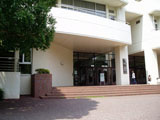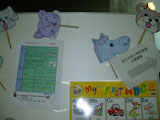「小学校英語活動講座・玉川大学文学部」
(Kids English Seminar at Tamagawa University)
◆
この夏に小学校の先生方を対象としたイベント、「小学校英語活動講座」を開いた佐藤久美子先生(玉川大学文学部・リベラルアーツ学科主任教授)にお話をうかがいました。佐藤先生は英語教育だけでなく、心理言語学と応用言語学の研究・教育にも携わっていらっしゃいます。
(The Kids English Seminar was held last summer by Dr. Kumiko Sato from the Liberal Art-Literature Department at Tamagawa University. She has worked in not only the field of English education but also in psycholinguistic and applied linguistics.)
QUESTION :
まず、今回の講座を開こうと思ったきっかけを教えていただけますか?
(Why did you decide to hold this seminar?)

|
|
佐藤先生
|
Dr. Sato:
公立の小学校の担任の先生方が、どのように子どもたちに英語を教えたら良いか分からず大変困っている、不安に感じているというお話を多くの先生方から伺いました。また、先生方が中学校時代に習った英語教育とは、小学校英語活動は違うということも、分かっていただければと思いました。そこで、多くの先生方に小学校英語活動の実態を知っていただき、少しでもスキルも含めてご理解いただき、小学校英語教育を推進できるためにお役に立ちたいと思ったからです。
(When I spoke with elementary school teachers, I found that most of them have difficulty teaching English, so I thought it would be a good opportunity to offer a seminar for them. Besides, I wanted to let them know the difference between the English education they had during their junior high school days and the English education they are going to give to elementary school students. I wanted them to understand this and the skills involved, and to also help them promote English education at elementary schools.)
QUESTION :
小学校だからこそできる英語活動は何だと思われますか?
(What are some effective ways of approaching English education in elementary schools?)

|
|
会場となった玉川大学文学部
|
Dr. Sato:
歌やチャンツ、ダンスイングリッシュ(ダンスに合わせて歌を歌う)などの耳から入る教育、さらに複数の感覚を使う活動です。聴覚だけではなく、視覚(絵本を見ながら英語のストーリーを聴く)、ダンスやジェスチャー、手をたたく、足を鳴らすなど、体を使いながら英語のリズムに慣れる、といった多くの感覚を取り入れながらの英語活動が特に低中学年では効果を発揮します。注意を向けて英語を聞き、発音する活動が容易にできます。
( I recommend activities that involve the children using their ears, such as singing songs, or any other of the senses. Vision is important, so it's good for students to listen to English stories with pictures. Dance, gestures, clapping - all of these are effective, especially for lower grades - because they will end up listening more carefully to English and pronouncing it better.)
QUESTION :
小学校の英語活動において、大切なことは何でしょうか。
教師はどんなことに注意をして教えるべきだと思われますか?
(What's important when teaching English to kids at elementary school? What do teachers need to be aware of?)
Dr. Sato:
英語が使えるって楽しい!という感覚を養うことです。今まで全くコミュニケーションが取れなかった外国のお友達と、Helloと一言交わすことで気持ちが通じる、という喜びを味わうことです。言語を一つ使えるようになることで、世界が広がり、将来の夢にも一歩近づく、といった気持ちを育てることが大切です。
(The important thing is to communicate to them how fun it is to use English! By simply saying, "Hello," you can make new friends you've never communicated with before. It's a great joy and I think that kids need to get this feeling through English class at elementary school. It's important to let them know that learning a foreign language will broaden their horizons and is a way of bringing their dreams that much closer to reality.)
そこで先生方も、知識としての英語を伝授するのではなく、コミュニケーションの手段としての「ことばの獲得」を目指す姿勢を持っていただけたらと思います。言葉が通じるって楽しい、使える言葉が増えると世界が広がり視野も広がる、ということを生徒たちに理解してもらうように、先生方も一緒に英語の時間を楽しんでいただきたいと思います。
(So I'd like to see teachers not only teaching English as knowledge, but as a form of communication. I would like them to enjoy it, too so that their students can feel the joy of English and enjoy themselves too.)

|
|
会場案内図
|
QUESTION :
語彙力について- 「かつての日本の中学校では500語程度の英単語力を課せられていたが、現在は約100語と減ってきている。それに対して、韓国では 既に小学校の時点で卒業までに約450語の英単語を課せられている」という先生のお話には驚きました。
この現状をどう思われますか?
(Now, let's talk about vocabulary: In your presentation, you told us that the number of words students have to know is decreasing in English classes in Japan. It used to be about 500 at junior high schools, but now it's only about 100. On the other hand, in South-Korea, the number is about 450 at elementary school. I was really shocked when I found out. What do you think about this?)
Dr. Sato:
日本の小中学校においても、もっと多くの語彙を導入してもらいたいと思います。伝えたい気持ちや出来事を表現できるチャンスが増えるからです。また、歌や絵本読みなどを積極的に導入していると、多くの語に出会い、小学生はそれほど苦労せずに意味を理解していきます。NHKラジオ講座「基礎英語3」の講師を担当していたときにも(1998年〜2002年)、放送用のストーリーを作るにあたり、文法レベルは中学校3年レベルに限定していましたが、単語については制限を設けず、多くの単語を導入しました。そのため、リスナーが楽しめるストーリーが展開できました。小学校でも、絵本読みなどを積極的に取り入れて欲しいと思います。
(I would like Japanese children to learn more words, because it will give them more of a chance to express their feelings or to tell people about things that happen around them. If they learn English by singing songs or using pictures, it won't be so hard for them to learn what it means. When I was in charge of the NHK radio program "Basic English 3 (1988-2002)," grammar was restricted to junior high school grade 3 level, but there were no limits on the number of words we could use. Over the course of the program, listeners could enjoy a great diversity of words. I hope reading picture books will be adopted more as a teaching method in elementary schools.)
QUESTION:
英語が、小学校で教科として必須化するかもしれないことについては、どのようにお考えでしょうか?
(English might become a compulsory subject at elementary schools. What do you think about this?)
Dr. Sato:
現在でも小学校英語活動は、地域によってかなりばらつきがあります。近隣に大学があり、大学生やボランティア、ALT の先生方が小学校を訪れ積極的に英語活動を推進している学校もあれば、地方などではそのような機会がなく、英語活動はほとんど行なわれていない学校もあります。小学生が等しく英語に触れ、学べる機会を持てるようになるためには、必修化はふさわしい方向だと思います。ただし、私たち教育に従事している者や行政に携わる方々が、担任の先生方が不安な気持ちを持たずに教えることができるように、先生方へ学習の機会を提供する、教材を開発するといった積極的な行動をすることが望まれます。
( At the moment, there is no standard approach to teaching English. It is taught differently, depending on the school. For example, if there is a university near an elementary school, kids have the chance to be taught by university students, volunteers or assistant learning teacher. However, in rural areas, they don't have this opportunity. So it's not equal. I think that's why it's a good thing if English becomes a compulsory subject because then the government will develop textbooks and offer training opportunities for teachers.)
QUESTION :
英語活動をしている、全国の小学校の先生に一言お願いします。
(Do you have anything you'd like to say to teachers at elementary schools?)

|
|
楽しいっていう気持ちが大切ね
|
Dr. Sato:
先生方自身がすべての英語活動のモデルになる必要はありません。CD や DVD など多くの教材がありますので、これをうまく活用してください。あとは、日ごろの教員として養われた教師力を発揮すれば、十分に英語活動は可能になります。子供たちと一緒に英語を楽しみながら学んでいくという気楽な気持ちを持って、携わっていただければと思います。
(I don't think there is a model way of teaching English. Use CDs and DVDs, and just use the teaching skills you already have. That way you can teach enjoyable English lessons. Just enjoy yourself and learn along with kids. Relax. Take it easy.)

|
☆次回は、このトレーニングに参加した山崎智明先生(東京都稲城市立若葉台小学校教諭)のインタビューをお届けします。お楽しみに!
(Next time, we will talk to Mr. Tomoaki Yamazaki (Wakabadai Elementary School, Inagi, Tokyo) who participated in the seminar at Tamagawa University.)
|
|







